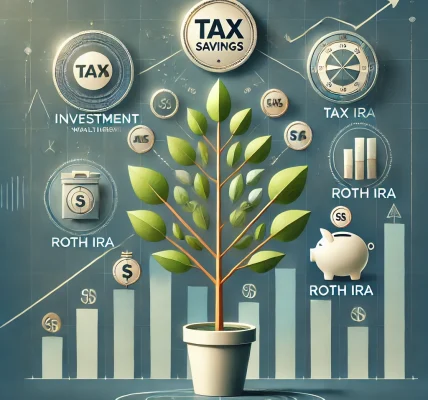Cryptocurrency has become a popular and potentially lucrative investment option, with many people flocking to digital currencies like Bitcoin, Ethereum, and other altcoins. While these investments have the potential for significant returns, understanding the tax implications of cryptocurrency investments is essential for managing your portfolio and avoiding any unexpected surprises when tax season arrives.
In this blog, we’ll break down how cryptocurrency investments are taxed, what you need to know to stay compliant with the IRS, and the strategies you can use to minimize your tax liability. Whether you’re a seasoned investor or just getting started, understanding the tax treatment of cryptocurrency is crucial for optimizing your investment strategy.
1. Is Cryptocurrency Taxable?
Yes, cryptocurrency is taxable. The IRS treats cryptocurrencies as property for tax purposes, meaning that cryptocurrency transactions, including buying, selling, and exchanging, are subject to capital gains taxes. This applies whether you are buying and holding Bitcoin or trading it for other assets.
It’s important to remember that, just like any other investment, profits from the sale of cryptocurrencies are taxable, and losses can potentially be used to offset gains for tax purposes (via capital gains tax loss harvesting).
2. Types of Taxable Cryptocurrency Events
Cryptocurrency taxation is event-driven, meaning that various transactions or events involving crypto assets can trigger tax obligations. Some common taxable events include:
a) Selling Cryptocurrency for Fiat Currency (USD, EUR, etc.)
When you sell cryptocurrency for traditional currency like U.S. dollars, the IRS treats this as a capital gain or loss. If the sale price of your cryptocurrency exceeds your purchase price, you’ll have a capital gain. If the sale price is lower than your purchase price, you’ll incur a capital loss.
- Short-Term Capital Gains: If you hold the cryptocurrency for one year or less, your gains will be taxed at the short-term capital gains rate, which is the same as your ordinary income tax rate.
- Long-Term Capital Gains: If you hold the cryptocurrency for more than one year, your gains will be taxed at the long-term capital gains rate, which is generally more favorable (ranging from 0% to 20%, depending on your income level).
b) Exchanging Cryptocurrency for Another Cryptocurrency
Swapping one cryptocurrency for another is also considered a taxable event. For example, if you exchange Bitcoin (BTC) for Ethereum (ETH), the IRS treats this as though you sold your Bitcoin and bought Ethereum, potentially incurring a taxable gain or loss.
Even if you don’t convert the cryptocurrency into fiat currency, the transaction is still taxable, and you’ll need to report any capital gains or losses.
c) Using Cryptocurrency for Purchases
If you use cryptocurrency to buy goods or services, this is also a taxable event. The IRS views it as a sale of the cryptocurrency, and you’ll need to report any gain or loss based on the difference between the price you paid for the cryptocurrency and the value of the cryptocurrency when you used it.
d) Earning Cryptocurrency
If you receive cryptocurrency as payment for services or work, this is treated as ordinary income and taxed accordingly. The fair market value of the cryptocurrency at the time of receipt is included in your gross income and subject to income tax.
Similarly, if you earn cryptocurrency through staking, mining, or participating in decentralized finance (DeFi) protocols, the value of the crypto you receive is taxable as income at the time it’s earned.
3. How to Calculate Capital Gains and Losses
To calculate capital gains or losses from cryptocurrency transactions, you’ll need to determine the cost basis (the original price you paid for the crypto) and the sale price (the amount you sold it for or exchanged it for). The difference between these two amounts is your capital gain or capital loss.
Example:
- Buy Price: You bought 1 Bitcoin (BTC) for $10,000.
- Sell Price: You sold 1 Bitcoin (BTC) for $15,000.
- Capital Gain: Your capital gain is $15,000 (sale price) – $10,000 (purchase price) = $5,000.
If you held the Bitcoin for more than a year, you would pay long-term capital gains tax on the $5,000 profit. If you held it for less than a year, you would pay short-term capital gains tax, which is taxed at your ordinary income tax rate.
4. Tax Reporting and Record Keeping
The IRS requires taxpayers to report all cryptocurrency transactions, and the onus is on the investor to maintain accurate records. This means tracking every cryptocurrency purchase, sale, exchange, and use in transactions. Failing to report these transactions can lead to penalties, interest, or even an audit.
Here are some best practices for record keeping:
- Track the Date of Acquisition and Sale: Always record the date you acquired and sold your cryptocurrency.
- Document Transaction Amounts: Note the amount of cryptocurrency bought or sold and the price at which the transaction took place.
- Report Transactions Properly: Use IRS Form 8949 to report capital gains and losses. You will also need to attach a Schedule D to your tax return to summarize these transactions.
You may also want to consider using a cryptocurrency tax software tool that can automatically track and report your transactions.
5. Tax Strategies to Minimize Your Tax Liability
There are several strategies you can use to reduce the amount of taxes you owe on your cryptocurrency investments:
a) Hold for the Long Term
One of the simplest ways to reduce your capital gains tax rate is by holding your cryptocurrency for more than a year. Long-term capital gains are taxed at lower rates than short-term gains, so holding your assets for over a year can lead to significant tax savings.
b) Tax-Loss Harvesting
If you have losses from cryptocurrency investments, you can sell those assets to offset any taxable gains from other cryptocurrency sales. This strategy is known as tax-loss harvesting and can help lower your overall tax bill. Be mindful of the wash sale rule, which applies to stocks but not cryptocurrencies (currently).
c) Donate Cryptocurrency to Charity
If you have appreciated cryptocurrency and are interested in charitable giving, donating it directly to a qualified charity can provide a tax benefit. Not only can you avoid paying capital gains tax on the appreciation, but you can also deduct the fair market value of the donation.
d) Utilize Tax-Advantaged Accounts (When Possible)
While cryptocurrencies are not directly allowed in traditional tax-advantaged accounts like IRAs and 401(k)s, there are crypto-specific retirement accounts that allow you to invest in crypto in a tax-efficient way. Consider exploring options like a self-directed IRA or a Crypto IRA to shelter your cryptocurrency investments from taxes.
6. The Future of Cryptocurrency Taxation
As cryptocurrency continues to grow in popularity and complexity, the IRS is updating its guidance and enforcement of crypto tax laws. It’s likely that tax regulations for cryptocurrency will continue to evolve, and more detailed reporting requirements may be introduced.
To stay compliant and minimize your tax liability, it’s essential to stay informed about changes in tax laws regarding cryptocurrency. Consulting with a tax professional experienced in cryptocurrency can help you navigate these changes and create a tax strategy that works for your investment goals.
7. Final Thoughts
Cryptocurrency investments can offer significant returns, but they also come with tax responsibilities. By understanding how cryptocurrency is taxed, keeping accurate records, and using tax-saving strategies, you can ensure that you’re compliant with IRS regulations while optimizing your investment returns.




